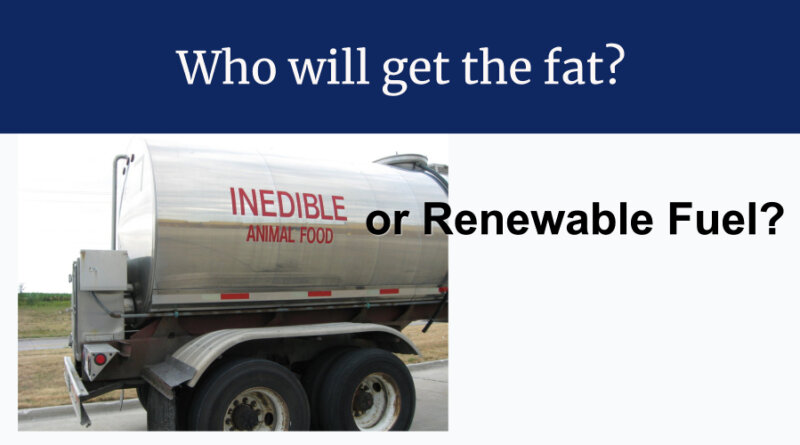Inedible Pet Feed Ingredient or Fuel? – Truth about Pet Food
The pet feed industry tactfully phrases it “US pet food manufacturers use a range of ingredients produced during the processing of human food, including both plant and animal products.” But in reality, some of the materials repurposed into pet feed ingredients is nothing more than waste, much of it illegal to use in any food (human or animal).
One category of those repurposed ingredients is fats. Fats commonly used in pet feed/animal feed are considered inedible (excluding human grade ingredient pet foods), sourced from the rendering of condemned animal carcasses, slaughter waste, non-slaughtered decomposing animal carcasses, and used restaurant grease. In no uncertain terms, inedible fats are considered adulterated per federal law – not allowed to be used in any food, human or animal. For decades, inedible fats (and other inedible ingredients) have been allowed to be disposed of into pet feed/animal feed through FDA enforcement discretion.
One example of the risk of inedible fats in pet food: in 2018 the JM Smucker company issued a massive recall (90 million pounds) of canned dog food due to the presence of pentobarbital (drug used to euthanize animals). This recall proved that pentobarbital euthanized animals were rendered – the inedible fat produced contained the euthanizing drug – and the adulterated fat was sold to pet feed.
For decades, the only industry eager to utilize inedible fats was pet food/animal feed. But that has changed.
Today two VERY different industries are fighting over who gets to buy inedible waste fat. One industry continues to be pet feed/animal feed. Their argument: “these are products pet food makers have been utilizing for decades, making the US food and agriculture industries more sustainable by reducing food waste.”
The other industry fighting to purchase inedible fat is the biofuel industry. Their argument is the fats are waste, more appropriately disposed of as renewable fuel. “Biodiesel produced from agricultural waste has been rapidly expanded around the world due to its relevant advantages such as being biodegradable, renewable and sulphur-free.”
The pet feed industry wants their inedible fats back. Through their trade association pet feed manufacturers are taking their battle to purchase inedible fats to lobbying Congress.
The Pet Food Institute has initiated a campaign (misleadingly) titled “Feed People and Pets First”. The trade association is telling Congress pet feed manufacturers are facing “unfair competition for fats and oils with fuel producers.” And the trade association is asking members of Congress “not to advance mandates and incentives for renewable diesel that use or include the fats and oils that are historically used in human and pet food.”
It is unknown what human food (edible) fats the Pet Food Institute is referencing. We found no evidence that the renewable fuel industries are purchasing edible fats (and the cost would be significantly higher, most likely cost prohibitive).
So…where do you stand? Do you believe inedible fats are better used for renewable fuel production or do you believe inedible fats should continue to be processed into pet feeds?
Personal Opinion: The FDA caused this mess through their selective enforcement of law and the pet feed industry took full advantage of regulatory looking the other way. If law had been enforced from the very beginning of commercial pet food, if inedible fats (and other inedible ingredients) were never greedily gathered up by the pet feed industry, they wouldn’t be in this mess complaining of shortages. In our opinion, plain and simple – inedible material is INEDIBLE. The best – the only use for inedible material is non-food products such as biofuel.
Regardless of blame, IF you believe that inedible fats should not be used in pet products – Congress needs to hear from you right away. Although I’m sure the biofuel industry is actively petitioning Congress to maintain their rights to purchase inedible fat, the pet feed industry is also petitioning Congress; they desperately want their inexpensive inedible fat sources back. Pet food consumers should weigh in with Congress on the issue too.
Example email:
The FDA’s enforcement discretion in pet food has resulted in a battle between two industries over inedible fats produced through rendering.
Inedible rendering produces fats sourced from condemned animal carcasses, non-slaughtered animals, and slaughter waste. Through FDA enforcement discretion, these fats have historically been allowed to be disposed of into pet foods even though they are a violation of the Federal Food Drug and Cosmetic Act. As well, these inedible fats have been historically disposed of into pet foods with no warning or disclosure to pet food consumers.
The inedible fats are now being properly processed into biofuel, however the Pet Food Institute is actively lobbying Congress to stop the sale of inedible fats to biofuel industries.
I disagree with FDA’s allowance of illegal, inedible waste ingredients into pet products with no warning or disclosure to consumers. The use of inedible fats in ‘food’ products for pets is no different. In 2018, inedible fats in pet foods were found to contain the drug used to euthanize animals (pentobarbital). No inedible material – sourced from condemned animal carcasses, non-slaughtered animal carcasses, or diseased animals directly allowed through FDA enforcement direction – should be allowed in pet food.
I encourage you to support the biofuel industries use of inedible fats. I also encourage Congress to take a close look at what the FDA Center for Veterinary Medicine allows to be disposed of in pet food with no warning or disclosure to pet owners.
Pet owners can locate their Representatives in Congress HERE.
Wishing you and your pet the best –
Susan Thixton
Pet Food Safety Advocate
TruthaboutPetFood.com
Association for Truth in Pet Food

Become a member of our pet food consumer Association. Association for Truth in Pet Food is a a stakeholder organization representing the voice of pet food consumers at AAFCO and with FDA. Your membership helps representatives attend meetings and voice consumer concerns with regulatory authorities. Click Here to learn more.
What’s in Your Pet’s Food?
Is your dog or cat eating risk ingredients? Chinese imports? Petsumer Report tells the ‘rest of the story’ on over 5,000 cat foods, dog foods, and pet treats. 30 Day Satisfaction Guarantee. Click Here to preview Petsumer Report. www.PetsumerReport.com
Find Healthy Pet Foods in Your Area Click Here

The 2022 List
Susan’s List of trusted pet foods. Click Here to learn more.





non prescription canadian pharmacy https://canadadrugs.pro/# – canadian mail order drugs canadadrugs.pro